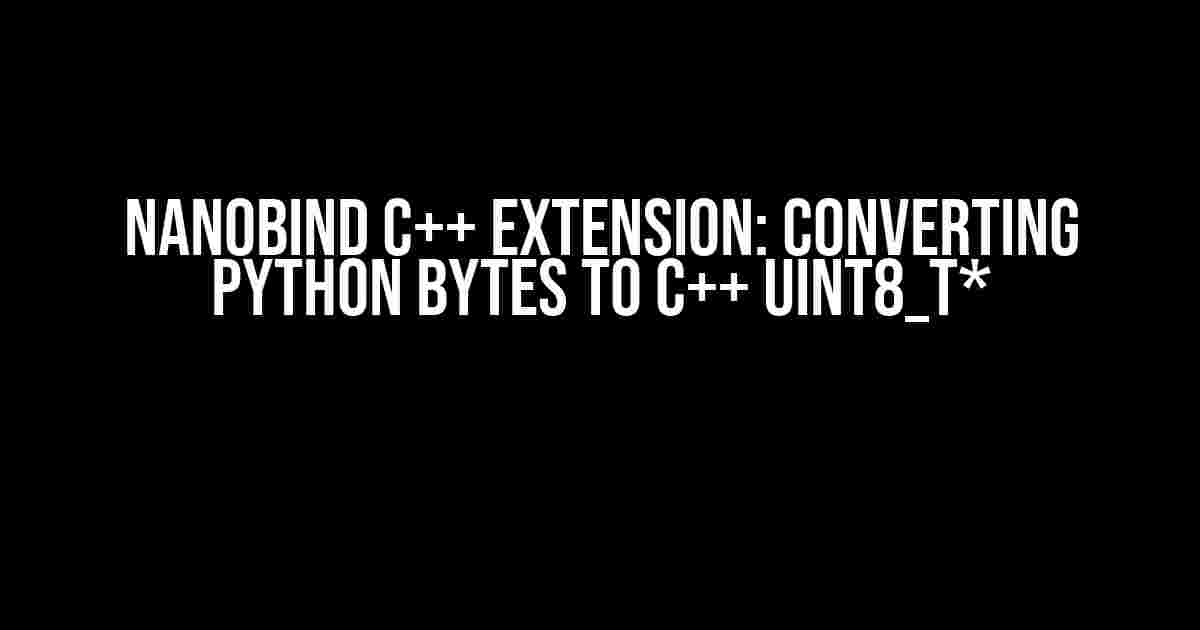Are you struggling to integrate your Python code with a C++ extension using Nanobind? Do you need to convert Python’s bytes object to a C++ uint8_t* pointer? Look no further! In this article, we’ll guide you through the process of converting Python bytes to C++ uint8_t* using Nanobind.
What is Nanobind?
Nanobind is a lightweight, header-only library that enables you to easily bind C++ code to Python. It provides a simple and efficient way to wrap C++ classes and functions, allowing you to call them from Python and vice versa. Nanobind is widely used in various fields, including scientific computing, data analysis, and machine learning.
Why Convert bytes to uint8_t*?
In Python, the bytes object is used to represent a sequence of bytes. When working with C++ extensions, you often need to pass data between Python and C++ functions. However, C++ functions typically expect a uint8_t* pointer as an argument, which is a pointer to an unsigned 8-bit integer. To interface with C++ code, you need to convert the Python bytes object to a C++ uint8_t* pointer.
Converting bytes to uint8_t* using Nanobind
To convert Python bytes to C++ uint8_t*, you’ll need to use Nanobind’s py::bytes and py::byte_ objects. Here’s a step-by-step guide to help you achieve this conversion:
-
Create a Nanobind module:
#include <nlohmann/json.hpp> #include <nanobind/nanobind.h> namespace nb = nanobind; namespace nlohmann = nlohmann::json; NB_MODULE-example{ nb::class_<MyCppClass>_("MyCppClass") .def(nb::init<>()) .def("my_cpp_function", &MyCppClass::my_cpp_function); } -
Define the C++ function that will receive the converted bytes:
class MyCppClass { public: void my_cpp_function(uint8_t* data, size_t size) { // process the data } }; -
In your Python code, create a bytes object and pass it to the C++ function:
import example data = b'\x01\x02\x03\x04' cpp_obj = example.MyCppClass() cpp_obj.my_cpp_function(data) -
In the Nanobind implementation, use the py::bytes object to convert the Python bytes to a C++ uint8_t* pointer:
.def("my_cpp_function", [](MyCppClass& self, py::bytes data) { uint8_t* data_ptr = (uint8_t*)data.data(); size_t data_size = data.size(); self.my_cpp_function(data_ptr, data_size); });
Understanding the Conversion Process
In the above code, we use the py::bytes object to capture the Python bytes object passed as an argument to the my_cpp_function. The py::bytes object provides a data() method that returns a pointer to the underlying bytes data, and a size() method that returns the size of the data in bytes.
We then cast the pointer returned by data() to a uint8_t* pointer, which is compatible with the C++ function’s expectation. Finally, we call the C++ function, passing the converted uint8_t* pointer and the data size as arguments.
Troubleshooting Common Issues
When working with Nanobind and converting Python bytes to C++ uint8_t*, you may encounter the following issues:
-
Error: cannot convert ‘py::bytes’ to ‘uint8_t*’ in initialization
Solution: Ensure that you’re using the correct casting syntax, i.e., (uint8_t*)data.data().
-
Error: ‘py::bytes’ has no member named ‘data’
Solution: Make sure you’re using the correct Nanobind version and that the py::bytes object is properly defined.
-
Error: Segmentation fault when calling the C++ function
Solution: Verify that the C++ function is correctly implemented and that the uint8_t* pointer is valid. Also, ensure that the data size is correct and that the C++ function is not accessing memory outside the allocated region.
Conclusion
In this article, we’ve demonstrated how to convert Python bytes to C++ uint8_t* using Nanobind. By following the steps outlined above, you should be able to successfully interface with C++ code from Python and vice versa. Remember to troubleshoot common issues and ensure that your C++ function is correctly implemented to avoid segmentation faults.
| Python | C++ |
|---|---|
| bytes | uint8_t* |
Now that you’ve mastered the art of converting Python bytes to C++ uint8_t*, you’re ready to take your Python-C++ integration to the next level!
Frequently Asked Question
Get ready to dive into the world of Nanobind C++ extension and uncover the secrets of converting bytes() in Python to uint8_t* in C++!
Q1: What is Nanobind C++ extension, and why do I need it?
Nanobind is a lightweight C++ library that allows you to seamlessly bind Python and C++ code. You need it to convert Python bytes objects to C++ uint8_t* pointers, which is essential for working with binary data in C++.
Q2: What is the difference between Python bytes and C++ uint8_t*?
Python bytes objects represent a sequence of bytes, whereas C++ uint8_t* is a pointer to an unsigned 8-bit integer. To work with binary data in C++, you need to convert Python bytes to a C++ uint8_t* pointer.
Q3: How do I convert Python bytes to C++ uint8_t* using Nanobind?
You can use Nanobind’s py::bytes class to convert Python bytes to a C++ uint8_t* pointer. Simply create a py::bytes object from your Python bytes, and then use the .data() method to get a uint8_t* pointer to the underlying data.
Q4: What if I need to pass a Python bytes object to a C++ function that takes a uint8_t* pointer?
No problem! You can use Nanobind’s py::bytes class to create a C++ uint8_t* pointer from a Python bytes object, and then pass it to your C++ function. Just remember to keep the Python bytes object alive for as long as the C++ function needs the pointer.
Q5: Are there any performance considerations when converting Python bytes to C++ uint8_t*?
Yes, be mindful of the performance implications of converting Python bytes to C++ uint8_t*. Nanobind’s py::bytes class creates a temporary C++ object that holds a reference to the Python bytes object, which can incur some overhead. If performance is critical, consider using other libraries or optimizing your code accordingly.

